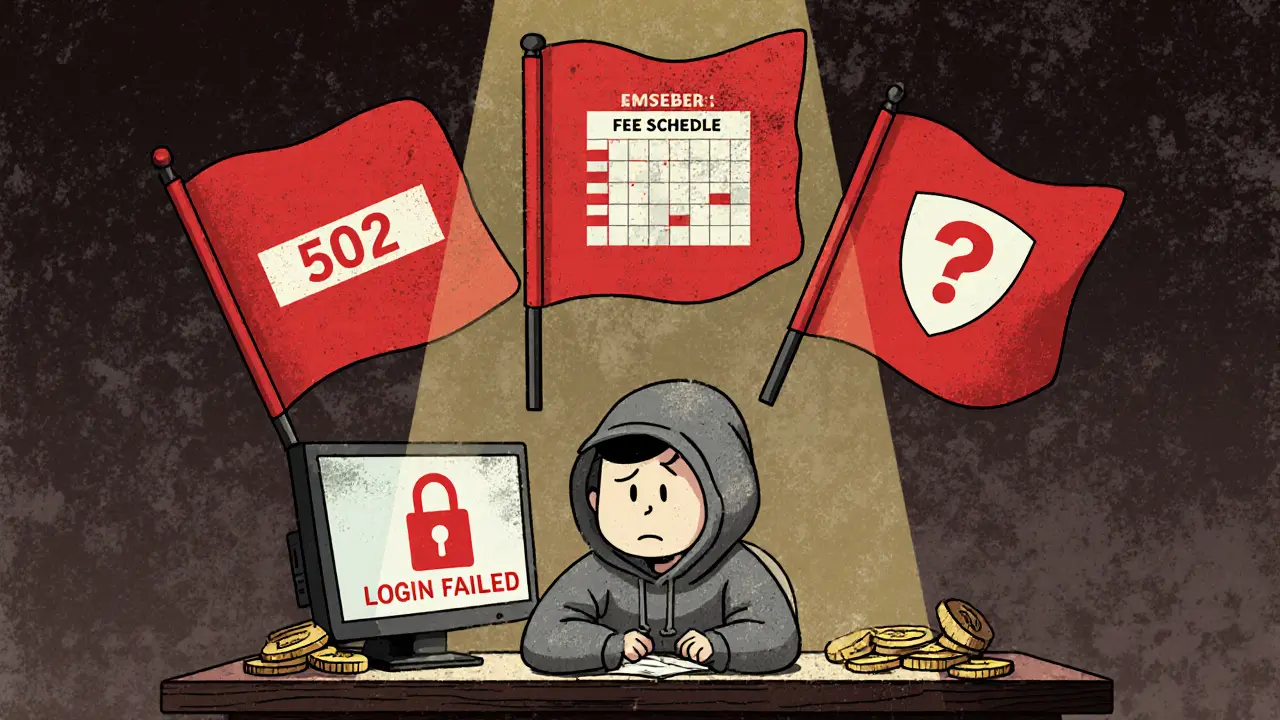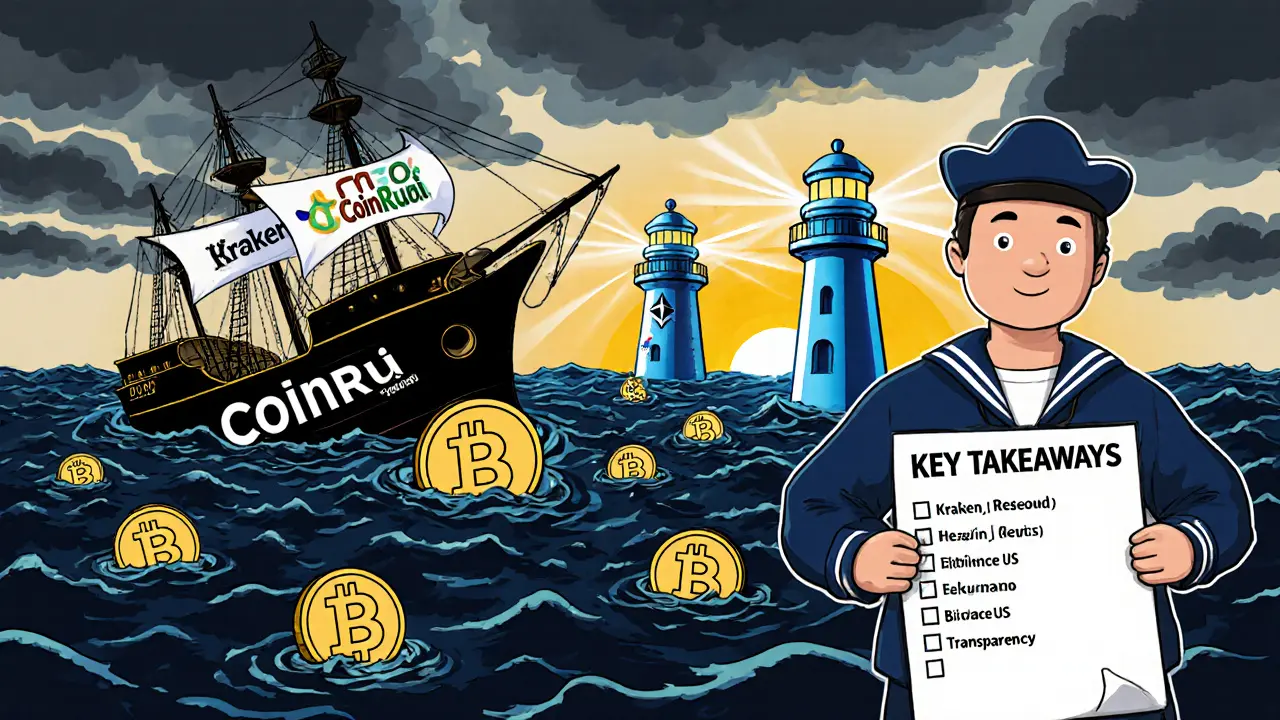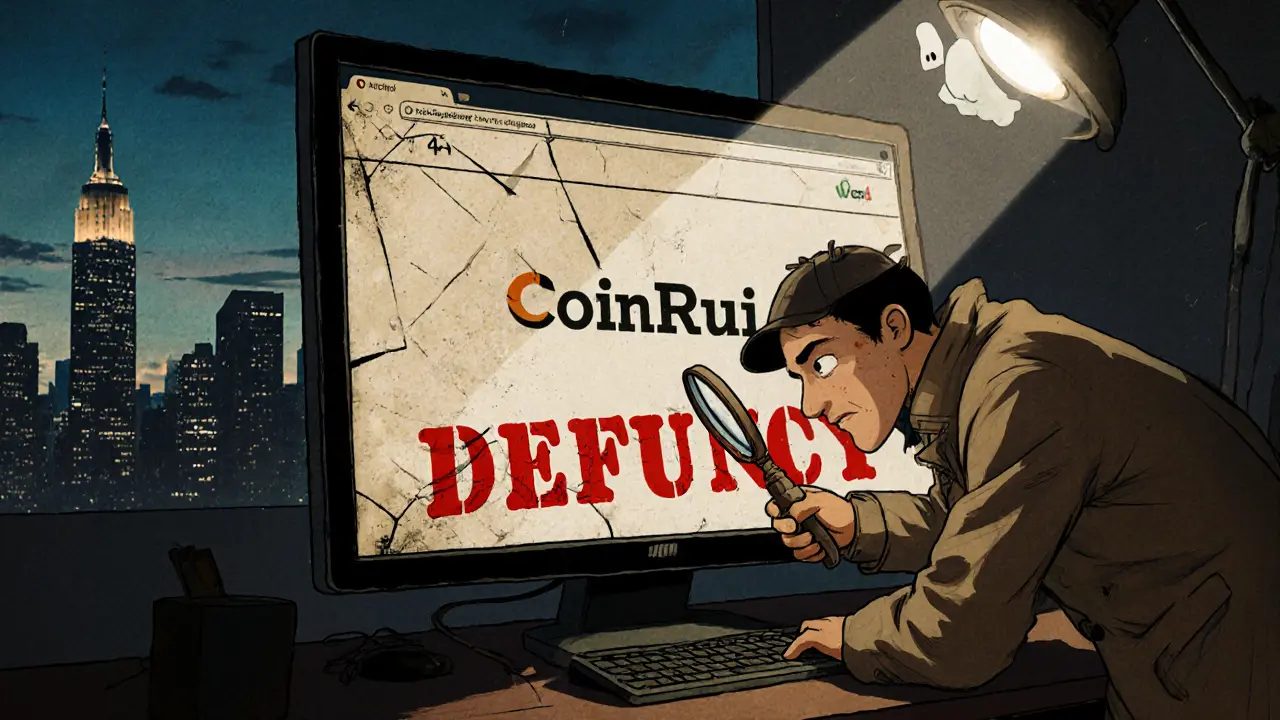Crypto Exchange Safety Checker
Check Your Exchange's Safety
Enter the safety criteria for the exchange you're considering to see if it meets minimum security standards. Avoid platforms that lack these essential features like CoinRui.
When you hear the name CoinRui is a crypto exchange that, as of 2025, no longer exists. The platform’s story reads like a warning sign for anyone hunting low‑cost or “unknown” exchanges. In this review we’ll break down what happened to CoinRui, why its downfall matters, and how you can avoid similar traps.
What CoinRui Was Supposed to Be
CoinRui launched as a small‑scale trading venue promising a simple interface and a handful of crypto pairs. The official site claimed fast deposits, minimal fees, and 24/7 support, but none of those promises ever materialized into a sustainable service. Early users reported a bare‑bones order book, sparse trading pairs, and a website that felt stuck in 2018.
The Red Flags That Started Appearing
By mid‑2020 users began noticing three glaring problems:
- Frequent downtime - the main trading page would randomly return a 502 error.
- Missing fee disclosures - the fee schedule was hidden behind a login that never worked.
- No verified security measures - no mention of cold storage, two‑factor authentication, or insurance.
These issues weren’t just inconveniences; they were early signs that the platform lacked basic operational hygiene.
How the Platform Collapsed
In July 2021 a user‑driven review on Revain.org summed up the situation: the site was essentially a "troublesome stage to accept." After that, the website vanished entirely. Attempts to reach customer support hit dead ends, and the domain stopped resolving. No bankruptcy filing, no fund recovery program - just silence.
What Users Lost
Because the exchange shut down without a proper winding‑down process, many traders found their crypto locked inside an inaccessible wallet. Reports of "misfortunes" and outright financial loss circulated on crypto forums. The lack of any escrow or insurance meant those assets were likely gone for good.
Comparing CoinRui to Live Exchanges in 2025
To put the failure in perspective, look at the three major exchanges that dominate the market today. The table below highlights their core strengths versus the void left by CoinRui.
| Exchange | Cryptocurrencies Offered | Fee Range | Security Features | Customer Support |
|---|---|---|---|---|
| Coinbase | 235 | 0% - 3.99% | Cold storage, 2FA, insurance fund | 24/7 live chat & phone |
| Kraken | 350+ | 0% - 0.4% | Cold storage, 2FA, SOC 2 compliance | Email & live chat |
| Binance US | 158 | 0% - 0.6% | SAFU fund, hardware key support | Live chat, knowledge base |
Notice the contrast: robust fee transparency, proven security, and active support. Those are the exact ingredients CoinRui missed.

Key Takeaways for Crypto Traders
- Always verify the exchange’s regulatory status. Registered entities are required to hold user funds in segregated accounts.
- Check for clear, published fee structures before depositing.
- Prefer platforms that list security measures like cold storage and insurance.
- Test customer support with a quick query; no response is a red flag.
- Keep large balances on hardware wallets or reputable custodians, not on a single exchange.
Lessons From the CoinRui Failure
CoinRui’s demise teaches three broader lessons about the crypto market:
- Regulatory compliance matters more than flashy marketing. Without a licence, an exchange can shut down overnight.
- Security protocols are non‑negotiable. If an exchange can’t prove cold storage or two‑factor authentication, expect trouble.
- Transparency builds trust. Missing fee tables or vague “contact us” pages should keep you away.
What To Do If You Still Have Funds Stuck on a Closed Exchange
While CoinRui’s case is largely a dead end, here’s a quick checklist for any defunct platform you might encounter:
- Gather all transaction IDs, screenshots, and email correspondence.
- File a complaint with your country’s financial regulator or consumer protection agency.
- Post the details in reputable crypto recovery forums - sometimes community pressure helps.
- Consider legal counsel if the amount is substantial.
Unfortunately, no guarantee exists that you’ll recover lost assets, which is why prevention is the best strategy.
Final Verdict on CoinRui
CoinRui is a textbook example of what not to do in the crypto exchange business. Its lack of security, missing fee disclosure, and abrupt shutdown left users in the dark. If you’re looking for a safe place to trade, steer clear of any platform that can’t match the basic standards shown by Coinbase, Kraken, or Binance US.

Is CoinRui still operational?
No. The website is offline, support channels are dead, and there is no public information about a revival or bankruptcy proceeding.
Can I recover funds lost on CoinRui?
Recovery is unlikely. Your best bet is to file complaints with regulators and seek legal advice, but most users have reported permanent loss.
How does CoinRui compare to Coinbase?
Coinbase offers over 200 cryptocurrencies, transparent fee tiers (0‑3.99%), cold storage, insurance, and 24/7 support. CoinRui lacked fee transparency, security measures, and any reliable support before shutting down.
What red flags should I watch for in new exchanges?
Missing licensing info, vague fee structures, no clear security policies, unresponsive support, and a brand that only exists on a single domain are major warning signs.
Where can I safely store my crypto now?
Consider reputable custodians like Coinbase Vault, hardware wallets (Ledger, Trezor), or regulated services that provide insurance and clear compliance documentation.


Mike GLENN
October 22, 2025 AT 08:37Reading through the CoinRui saga really drives home how fragile an exchange can be when the basics are ignored, and it’s a stark reminder that due diligence isn’t just a buzzword. The first red flag was the frequent 502 errors that made trading feel like a gamble on server uptime rather than a reliable service. Then there was the hidden fee schedule, which basically forced users to guess how much they’d be charged, a practice that undermines trust. Security was practically non‑existent; no mention of cold storage, no two‑factor authentication, and certainly no insurance fund to protect deposits. Those gaps are exactly why regulators push for transparent licensing, because without that backbone an exchange can disappear overnight. When the platform vanished in 2021, users were left staring at an inaccessible wallet, a loss that could have been mitigated by moving funds to a hardware device. The lesson here is to treat any new or obscure exchange like you would a stranger offering you a loan – ask for proof, ask for references, and don’t hand over your keys without a solid guarantee. Check the domain history and see if the team has a track record; a brand that only lives on a single domain for a few years is a cautionary sign. Look at the security page – if it’s vague or missing, walk away. Also, run a small test deposit first; a responsive support channel can be the difference between a quick fix and a dead end. Compare the fees openly listed on reputable exchanges; hidden fees are a classic way to bleed users slowly. Finally, keep the bulk of your holdings off‑exchange, preferably in a hardware wallet or a regulated custodian that offers insurance. By following these steps, you can avoid the pitfalls that swallowed so many CoinRui users, and you’ll be better positioned to protect your assets in an increasingly complex crypto landscape.
Jireh Edemeka
October 27, 2025 AT 11:13Ah, the classic "big promises, no delivery" playbook – CoinRui really nailed the art of disappearing without a trace, didn’t they?
del allen
November 1, 2025 AT 14:50i actually lost some btc on that site lol 😅 they said fast deposits but my balance just stayed in limbo
Jon Miller
November 6, 2025 AT 18:26Man, I remember the moment the site went down – I was mid‑trade and it just froze, had to cancel everything. Crazy how quickly you can lose confidence.
Nikhil Chakravarthi Darapu
November 11, 2025 AT 22:03The lack of any regulatory oversight on CoinRui was a glaring sign that the platform was operating outside the bounds of any financial jurisdiction, making user recourse virtually impossible.
Tiffany Amspacher
November 17, 2025 AT 01:40In the grand tapestry of crypto history, CoinRui serves as a cautionary thread – a reminder that without transparency, the fabric unravels.
James Williams, III
November 22, 2025 AT 05:16From a technical standpoint, the absence of two‑factor authentication and cold storage indicates a severe lapse in industry‑standard security protocols, which should have been a deal‑breaker before any deposits were made.
Amy Kember
November 27, 2025 AT 08:53Look, missing fee tables are a red flag. No support response = no trust. Keep assets off unknown sites.
Scott McCalman
December 2, 2025 AT 12:30Nice breakdown! 👍
PRIYA KUMARI
December 7, 2025 AT 16:06The CoinRui debacle is a textbook example of why aggressive marketing without substance leads to catastrophic user fallout, and the community needs to call out such reckless behavior.
Prerna Sahrawat
December 12, 2025 AT 19:43When evaluating a nascent exchange, one must consider not only the marketplace liquidity but also the underlying governance structures that ensure fiduciary responsibility; unfortunately, CoinRui operated in a vacuum devoid of any verifiable compliance metrics. The platform’s intermittent uptime suggests a weak infrastructure, perhaps built on under‑provisioned cloud services, which alone should have prompted a deeper technical audit before any capital allocation. Moreover, the concealed fee schedule reflects a strategic opacity that is antithetical to the transparency ethos championed by the broader crypto ecosystem. Users who placed trust in such an institution were inevitably exposed to heightened counterparty risk, a risk exacerbated by the lack of custodial segregation of funds. In hindsight, the absence of a clearly defined security roadmap-no mention of cold storage, multi‑sig wallets, or insurance-demonstrates a profound disregard for safeguarding user assets. Consequently, the liquidation of CoinRui’s services left a vacuum of accountability, with users scrambling for evidence of solvency that simply did not exist. This scenario underscores the necessity for prospective traders to demand independent security attestations and to verify the existence of regulatory licenses before committing funds. By adhering to these rigorous standards, the community can collectively mitigate the recurrence of such avoidable catastrophes.
Joy Garcia
December 17, 2025 AT 23:20Honestly, I think there’s a whole hidden cabal of “exchanges” that vanish on purpose to siphon funds-CoinRui might just be the tip of the iceberg.
mike ballard
December 23, 2025 AT 02:56From a cultural perspective, it’s fascinating how quickly the crypto community rallies around a new platform, only to turn its back once the rug is pulled; it says a lot about trust dynamics.
Molly van der Schee
December 28, 2025 AT 06:33Even though the loss is painful, it’s a chance to learn and grow; future traders can use this as a stepping stone toward more secure practices.
Mike Cristobal
January 2, 2026 AT 10:10We must hold ourselves to higher ethical standards; platforms that operate in the shadows betray not only users but the principle of financial integrity.
BRIAN NDUNG'U
January 7, 2026 AT 13:46To all aspiring traders: prioritize security, verify licensing, and never place more capital than you can afford to lose; these disciplined habits will safeguard your journey in the volatile crypto market.